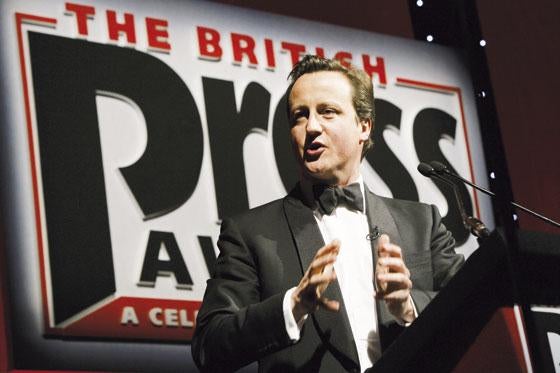
The Conservatives would freeze the BBC licence fee for one year in response to the recession, party leader David Cameron announced today.
Cameron challenged the Government to match his pledge, which he said would provide a lead in showing how taxpayer-funded institutions can “deliver more for less”.
Speaking at a press conference in London, Cameron said he wanted to see the BBC “prosper and succeed and continue to be a fantastic cultural asset”.
But he said that, in the current tough economic climate, all public institutions had to show that they can “live within their means” and the compulsory fee of £139.50 a year for a colour set should be frozen for one year.
“The BBC is one of our most important national institutions,” he said.
“It plays an important role in bringing the country together. I want to see it prosper and succeed and continue to be a fantastic cultural asset for Britain.
“But the BBC also needs to maintain public support and I want it to lead by example at a time when the whole country is tightening its belt.
“I am announcing today that we would freeze the BBC licence fee for one year and we will be challenging the Government over this in Parliament.
“Doing that would be an important signal of the need for all public institutions in these difficult times to do more with less.”
The licence fee settlement announced by the Government in 2007 envisages a gradual increase to a maximum £151.50 in 2012.
But Cameron said “the world has changed since then” and other broadcasters were facing “an incredibly difficult time” due to falls in advertising revenues.
He said: “I am a supporter of the BBC, I am a supporter of the licence fee. I have always believed that the three channels of money into British television – subscription, advertising and licence fee – is good for British television.”
But he added: “I think there is a danger, if we don’t do what we are suggesting, that we are going to get a system that is out of balance, with the BBC just having so much more market power and audience than anyone else that the system will become rather skewed.
“I think the licence fee can go on as the principal way of funding the BBC for some time, but it will be more difficult if they don’t do what I am suggesting today.”
Reaction
Liberal Democrat shadow culture secretary Don Foster said it was “crazy” to suggest cuts to the BBC at a time when it is seeking to provide support to other struggling media groups.
“The Conservatives are living in cloud cuckoo land if they think they can slash millions from the BBC’s budget without it seriously damaging programming and services,” he said.
“Commercial broadcasters are already being forced to cut back on their programme spending and a cut to the BBC’s budget of this scale would have a horrendous impact on jobs in the independent production sector.
“With many viewers staying at home a lot more during the recession, it really doesn’t seem the right time to be cutting the quality of our television programmes.”
A statement from the BBC Trust said: “The BBC must live within its means, but unplanned reductions in the licence fee could put services at risk which would not be in the interests of licence fee-payers.
“Funding stability is important to the BBC’s creative and editorial independence.
“It is a unique privilege which carries big responsibilities to deliver high quality programmes and services and to play a leading role in digital switchover.
“As the public face the reality of a recession, the BBC has an even greater responsibility to demonstrate to them that the 39p a day it receives from every licence fee-payer is working hard and being spent to deliver something of real value to them.
“This year’s increase is part of a six-year licence fee settlement, decided and announced by the Government in January 2007, which includes flexibility in the final year where the fee has not yet been set.
“The licence fee increases are partly designed to fund the digital switchover programme, which includes help and support for the most vulnerable in society in making the transition to digital television.
“The BBC is committed to delivering more for less, and has been set tough efficiency targets by the BBC Trust that it must achieve over the licence fee settlement.
“These amount to 15 per cent by 2012/13, equalling £1.9bn over the period, and will be achieved without jeopardising the programmes and services that audiences love.
“The BBC also faces new demands because of the recession. It has a vital role to play supporting other parts of the industry.
“Now more than ever, the public will look to the BBC for the kind of programmes, including drama and factual, which others simply aren’t making.
“We are now engaged in a series of partnership initiatives which will help other broadcasters and programme makers.”
Email pged@pressgazette.co.uk to point out mistakes, provide story tips or send in a letter for publication on our "Letters Page" blog







